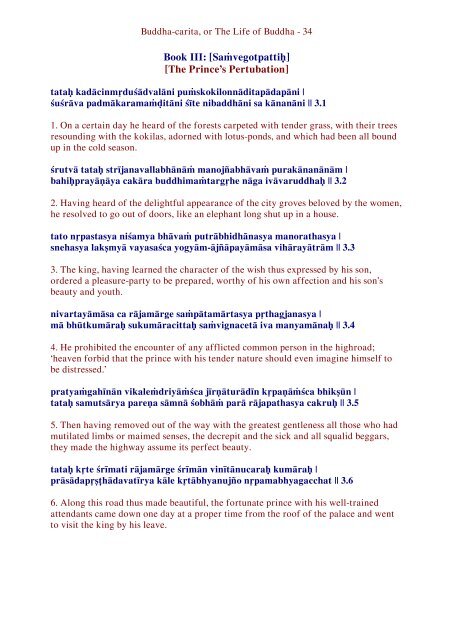The Buddha-Carita or The Life of Buddha by Ven. Aśvaghoṣa
A Sanskrit and English line by line (interlinear) version of one of the most important and influential biographies of the Buddha (together with extensive annotation).
A Sanskrit and English line by line (interlinear) version of one of the most important and influential biographies of the Buddha (together with extensive annotation).
You also want an ePaper? Increase the reach of your titles
YUMPU automatically turns print PDFs into web optimized ePapers that Google loves.
<strong>Buddha</strong>-carita, <strong>or</strong> <strong>The</strong> <strong>Life</strong> <strong>of</strong> <strong>Buddha</strong> - 34<br />
Book III: [Savegotpattiḥ]<br />
[<strong>The</strong> Prince’s Pertubation]<br />
tataḥ kadācinmduśādvalāni puskokilonnāditapādapāni |<br />
śuśrāva padmākaramaḍitāni śīte nibaddhāni sa kānanāni || 3.1<br />
1. On a certain day he heard <strong>of</strong> the f<strong>or</strong>ests carpeted with tender grass, with their trees<br />
resounding with the kokilas, ad<strong>or</strong>ned with lotus-ponds, and which had been all bound<br />
up in the cold season.<br />
śrutvā tataḥ strījanavallabhānā manojñabhāva purakānanānām |<br />
bahiḥprayāṇāya cakāra buddhimatarghe nāga ivāvaruddhaḥ || 3.2<br />
2. Having heard <strong>of</strong> the delightful appearance <strong>of</strong> the city groves beloved <strong>by</strong> the women,<br />
he resolved to go out <strong>of</strong> do<strong>or</strong>s, like an elephant long shut up in a house.<br />
tato npastasya niśamya bhāva putrābhidhānasya man<strong>or</strong>athasya |<br />
snehasya lakṣmyā vayasaśca yogyām-ājñāpayāmāsa vihārayātrām || 3.3<br />
3. <strong>The</strong> king, having learned the character <strong>of</strong> the wish thus expressed <strong>by</strong> his son,<br />
<strong>or</strong>dered a pleasure-party to be prepared, w<strong>or</strong>thy <strong>of</strong> his own affection and his son’s<br />
beauty and youth.<br />
nivartayāmāsa ca rājamārge sapātamārtasya pthagjanasya |<br />
mā bhūtkumāraḥ sukumāracittaḥ savignacetā iva manyamānaḥ || 3.4<br />
4. He prohibited the encounter <strong>of</strong> any afflicted common person in the highroad;<br />
‘heaven f<strong>or</strong>bid that the prince with his tender nature should even imagine himself to<br />
be distressed.’<br />
pratyagahīnān vikaledriyāśca jīrṇāturādīn kpaṇāśca bhikṣūn |<br />
tataḥ samutsārya pareṇa sāmnā śobhā parā rājapathasya cakruḥ || 3.5<br />
5. <strong>The</strong>n having removed out <strong>of</strong> the way with the greatest gentleness all those who had<br />
mutilated limbs <strong>or</strong> maimed senses, the decrepit and the sick and all squalid beggars,<br />
they made the highway assume its perfect beauty.<br />
tataḥ kte śrīmati rājamārge śrīmān vinītānucaraḥ kumāraḥ |<br />
prāsādapṣṭhādavatīrya kāle ktābhyanujño npamabhyagacchat || 3.6<br />
6. Along this road thus made beautiful, the f<strong>or</strong>tunate prince with his well-trained<br />
attendants came down one day at a proper time from the ro<strong>of</strong> <strong>of</strong> the palace and went<br />
to visit the king <strong>by</strong> his leave.


















